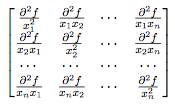| (One intermediate revision by the same user not shown) | |||
| Line 1: | Line 1: | ||
| − | The Hessian of a function (denoted <math>F(x_1, x_2, \cdots , x_n)</math>) is the multivariate equivalent to the second derivative of a single variable function. Similar to the [[gradient_Old Kiwi]] of a multivariate function, the Hessian is a square matrix where each entry is the composite of two partial differentiations. For a function <math>f(x_1, x_2, \cdots , x_n)</math>, the Hessian is defined as: | + | The Hessian of a function (denoted <math>F(x_1, x_2, \cdots , x_n)</math>) is the multivariate equivalent to the second derivative of a single variable function. Similar to the [[gradient_Old Kiwi| Gradient]] of a multivariate function, the Hessian is a square matrix where each entry is the composite of two partial differentiations. For a function <math>f(x_1, x_2, \cdots , x_n)</math>, the Hessian is defined as: |
[[Image:Hessian_Old Kiwi.png]] | [[Image:Hessian_Old Kiwi.png]] | ||
| + | |||
| + | ---- | ||
| + | This page was contributed by [[User:Srudolph|Stephen]]. Enjoy! | ||
[[Category:Linear Algebra]] | [[Category:Linear Algebra]] | ||
Latest revision as of 13:20, 2 April 2010
The Hessian of a function (denoted $ F(x_1, x_2, \cdots , x_n) $) is the multivariate equivalent to the second derivative of a single variable function. Similar to the Gradient of a multivariate function, the Hessian is a square matrix where each entry is the composite of two partial differentiations. For a function $ f(x_1, x_2, \cdots , x_n) $, the Hessian is defined as:
This page was contributed by Stephen. Enjoy!


